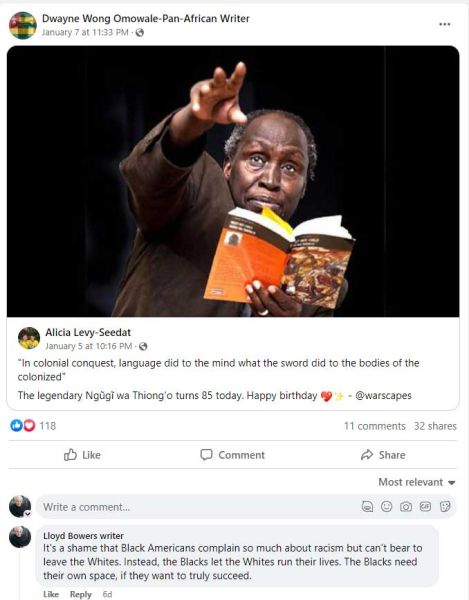Dissenting to the masquerade
I am a dissident to much that goes on in the modern society. I see entirely too much masquerading, and little self-evident intention. It has reached such a level that I consider the intentions deceptive.
Even among people who agree with me, no one wants to challenge it, to call it down, or to make it reveal or explain itself. The masquerading amounts to our casual acceptance of a personal double-standard, inasmuch as the masqueraders do not have to explain the discrepancies. Like any person with a double-standard, we eventually have to ask, "Do as you say?" or "Do as you do?"
This post from Dwayne Wong Omowale appeared on my Facebook page, and it made me curious. Omowale announces that Kenyan writer Ngũgĩ wa Thiong'o celebrated his 85th birthday. Omowale quotes Ngũgĩ, "In colonial conquest, language did to the mind what the sword did to the bodies of the colonized." We have all read similar posts—typical, group think denunciation of White people exploiting Black people.
So I read up on both Ngũgĩ and Omowale, and perhaps you will share my confusion. Both live in the U.S. Ngũgĩ suffered bodily harm while imprisoned for a year—not from White imperialists in the U.S., but in his home country, Kenya. State-sponsored terrorists in Kenya murdered his brother and tortured his mother. In addition, hoodlums in Kenya burglarized his home and raped his wife.
Not too surprising that he prefers to live in the U.S. I just wish he had more regard for the U.S. and its institutions. After all, he lives here.
Wikipedia's article on Ngũgĩ mentions his novel in 1967 titled A Grain of Wheat. Wikipedia writes that the novel "marks his embrace of Fanonist Marxism." Although he wrote it while teaching at Northwestern University, and presumably enjoying the perks of a capitalist society, he insisted that he himself was a Marxist and more or less proved that when he visited the Soviet Union as a guest of the Soviet Writers' Union, and although he visits Kenya periodically, he obviously prefers life in the U.S., where he can actually make money on his writings and enjoy regular employment with no risk of arrest and imprisonment, as he would in his own country.
Also not surprisingly, Thiong'o never mentions Kenya's pressing issues. He's too busy blaming the colonials and imperialism. Overpopulation, for instance, has led to violent conflict between tribal groups over the use of Kenya's water and land resources. The tribal conflicts, corrupt leadership in Kenya, and the violent legacy of the Mau-Mau also make European and American corporations less interested in investing in Kenya; so many Kenyans cannot find work.
In short, you have a guy who vents his anger on the White-colonizers and their capitalist system— who, however, lives in a capitalist country populated by Whites. Such things undermine Ngũgĩ's credibility. Whoever cannot see the hypocrisy of his position is not thinking for himself, and that undermines his credibility, as well.


